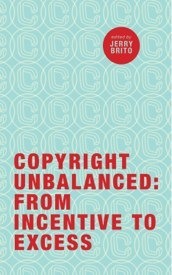Will libertarians jump ship on copyright?
 Jerry Brito, a senior research fellow at the Mercatus Center at George Mason University and the director of GMU’s technology policy program, has alerted us to a new book which, we suspect, might be at the leading edge of a trend. First, here’s a link to the book, which is called “Copyright Unbalanced: From Incentive to Excess.” You get a sense of the book’s perspective from the title — the argument is that copyright has in effect become just another arm of big government . . . a system that no longer functions as an effective incentive to creative labor, but instead increasingly interferes with personal liberty, suppresses speech, and enriches government’s cronies at the public’s expense. What makes this book especially noteworthy is the impressive roster of libertarians who are interested in copyright, and are not particularly fond of it, including the National Review’s Reihan Salam, GOP strategist Patrick Ruffini, and the Cato Institute’s Tim Lee.
Jerry Brito, a senior research fellow at the Mercatus Center at George Mason University and the director of GMU’s technology policy program, has alerted us to a new book which, we suspect, might be at the leading edge of a trend. First, here’s a link to the book, which is called “Copyright Unbalanced: From Incentive to Excess.” You get a sense of the book’s perspective from the title — the argument is that copyright has in effect become just another arm of big government . . . a system that no longer functions as an effective incentive to creative labor, but instead increasingly interferes with personal liberty, suppresses speech, and enriches government’s cronies at the public’s expense. What makes this book especially noteworthy is the impressive roster of libertarians who are interested in copyright, and are not particularly fond of it, including the National Review’s Reihan Salam, GOP strategist Patrick Ruffini, and the Cato Institute’s Tim Lee.
“Copyright Unbalanced” suggests to us that anti-copyright arguments are gaining ground among conservatives and libertarians. We wrote recently of the possibility that copyright policy could become a partisan issue — with the GOP moving away from support for ever-expanding copyright, and the Democrats left as the party supporting increasingly harsh laws. Why? Two reasons. First, because the entertainment industries heavily favor the Democrats, and the GOP has less to lose from taking a stand in favor of more carefully balancing copyright with the interests of users. Second, because the GOP might actually have something to gain. The libertarian wing of the GOP is the most intellectually vibrant part of the party, and tech-friendly libertarians are increasingly questioning the strength of copyright’s economic logic and noting that copyright law often favors the interests of old, boring incumbent firms against inventive start-ups.
A few days after our piece on the changing politics of copyright, the Republican Study Committee (a group of conservative GOP House members) put out a document sharply criticizing current copyright law and calling for deep reforms. That was on a Friday, but by Sunday, after what we imagine were some furious phone calls from entertainment industry lobbyists, the RSC report was withdrawn.
So here’s another prediction: this genie isn’t going back into the bottle so easily. The arguments against over-broad copyright are out there in the libertarian and conservative ecosystem, and they are spreading. Some smart GOP strategist, somewhere, is mulling over whether taking a stand in favor of more balanced copyright is a good way for the GOP to appeal to younger voters, who spurned the party this November. We’ll be hearing more about this.



